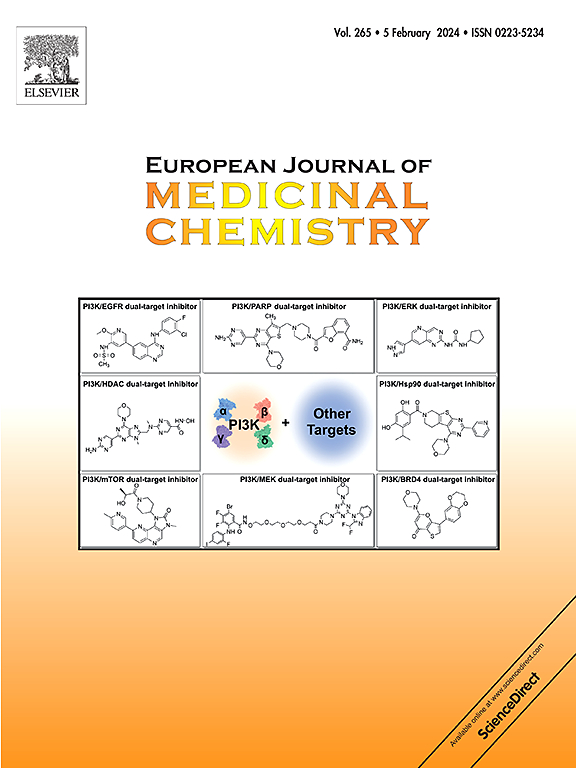Orphan GPCRs regulate the metabolic liver diseases through mediating the crosstalk between the liver and immune cells: Mechanisms and therapeutics
IF 5.9
2区 医学
Q1 CHEMISTRY, MEDICINAL
引用次数: 0
Abstract
Metabolic dysfunction-associated steatotic liver disease (MASLD) is the most common liver condition with increasing prevalence and few therapeutic options. Inflammatory pathways elicited by intrahepatic cell-autonomous ways or infiltration of immune cells are tightly coordinated to drive the progression of MASLD. Besides the extensively studied intrahepatic inflammatory pathways, the novel genes that mediate immune cell-liver crosstalk greatly impact the severity of MASLD and liver fibrosis by migration of immune cells into the liver. Among the genes are orphan G protein-coupled receptors (GPCRs), which are previously understudied transmembrane receptors without validated ligands. Here we critically discuss the emerging dual functions of GPR65, GPR18 and GPR84 expressed in bone marrow-derived immune cells in the progression of MASLD. They orchestrate the immune cell-liver crosstalk and regulate certain stages in the progression of MASLD. Our analyses indicate that GPR65, GPR18 and GPR84 are validated new targets for treating MASLD. GPR65 antagonists, GPR18 and GPR84 agonists are promising lead compounds for ameliorating MASLD and liver fibrosis through biasedly regulating the GPCR-coupled downstream signaling. The mechanisms, advantages and limitation of the agonists and antagonists have been critically discussed. The emerging critical function of orphan GPCRs in regulating the immune cell-liver crosstalk deepens our understanding of the pathogenesis of MASLD and liver fibrosis. Moreover, the concepts of biased agonists and pepducins that mimic the intracellular loops of GPCRs provide new approaches to address the challenges in the selectivity of targeting orphan GPCR-mediated immune cell-liver crosstalk and the treatment of MASLD.


孤儿gpcr通过介导肝脏和免疫细胞之间的串扰调节代谢性肝病:机制和治疗方法
代谢功能障碍相关脂肪变性肝病(MASLD)是最常见的肝脏疾病,患病率不断上升,治疗选择很少。由肝内细胞自主方式或免疫细胞浸润引发的炎症途径紧密协调,驱动MASLD的进展。除了广泛研究的肝内炎症途径外,介导免疫细胞-肝串扰的新基因通过免疫细胞迁移到肝脏,极大地影响了MASLD和肝纤维化的严重程度。在这些基因中有孤儿G蛋白偶联受体(gpcr),这是以前研究不足的跨膜受体,没有有效的配体。在这里,我们批判性地讨论GPR65, GPR18和GPR84在骨髓源性免疫细胞中表达在MASLD进展中的新出现的双重功能。它们协调免疫细胞-肝脏串扰并调节MASLD进展的某些阶段。结果表明,GPR65、GPR18和GPR84是治疗MASLD的新靶点。GPR65拮抗剂、GPR18和GPR84激动剂被认为是有前途的先导化合物,可以通过偏倚调节gprcr偶联的下游信号传导来改善MASLD和肝纤维化。本文对激动剂和拮抗剂的作用机制、优点和局限性进行了评述。孤儿gpcr在调节免疫细胞-肝串扰中的关键功能的出现加深了我们对MALSD和肝纤维化发病机制的理解。此外,模拟gpcr细胞内环的偏激激动剂和肽肽的概念为解决特异性靶向gpcr介导的孤儿免疫细胞-肝串扰和MASLD治疗方面的挑战提供了新的方法。
本文章由计算机程序翻译,如有差异,请以英文原文为准。
求助全文
约1分钟内获得全文
求助全文
来源期刊
CiteScore
11.70
自引率
9.00%
发文量
863
审稿时长
29 days
期刊介绍:
The European Journal of Medicinal Chemistry is a global journal that publishes studies on all aspects of medicinal chemistry. It provides a medium for publication of original papers and also welcomes critical review papers.
A typical paper would report on the organic synthesis, characterization and pharmacological evaluation of compounds. Other topics of interest are drug design, QSAR, molecular modeling, drug-receptor interactions, molecular aspects of drug metabolism, prodrug synthesis and drug targeting. The journal expects manuscripts to present the rational for a study, provide insight into the design of compounds or understanding of mechanism, or clarify the targets.

 求助内容:
求助内容: 应助结果提醒方式:
应助结果提醒方式:


